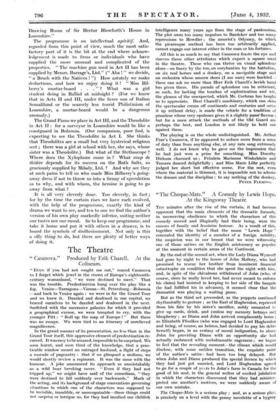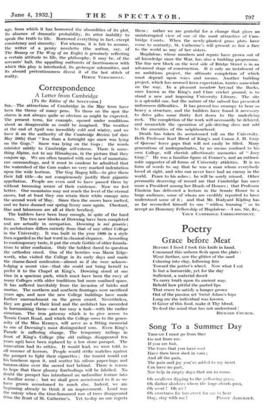"The Cheque-Mate." A Comedy by Lewis Hope. At the Kingsway
Theatre
TEN minutes after the rise of the curtain, it had become apparent that the main elements of the dramatic formula, in unswerving obedience to which the characters of this comedy moved and illogically had their being, were the canons of family and feminine honour. As a result of this, together with the belief that the name " Lewis Hope " concealed the identity of a member of a foreign nobility, the suspicion was in our breast that we were witnessing one of those satires on the English aristocracy so popular at the moment in certain areas of the Continent.
By the end of the second act, when the Lady Diana Wyneott had gone by night to the house of John Mallory, who had promised to rescue her brother from imminent financial catastrophe on condition that she spent the night with him, and, in spite of the chivalrous withdrawal of John (who, of course, since he really loved her, had never meant to enforce his claim) had insisted in keeping to her side of the bargain (he had fulfilled his in advance), it seemed clear that the dramatist was playing a waiting game.
But as the third act proceeded, as the puppets continued rhythmically to gesture ; as the Earl of Hughendon, reprieved from his fate by his sister's sacrifice, nobly consented to give up cards, drink, and (unless my memory betrays me) blasphemy ; as Diana and John arrived complacently home ; as Elizabeth Ffoulkes (who was engaged to Lord Hughendon and being, of course, an heiress, had decided to pay his debts herself) began, in an ecstasy of moral indignation, to abuse John for providing Diana with an opportunity she had actually embraced with melodramatic eagerness ; we began to feel that the revealing moment—the climax which would disclose, with some sudden transition, the exquisite point of the author's satire—had been too long delayed. But when John and Diana produced the special licence by which they had just got married, and Lord Hughendon agreed to go for a couple of years to John's farm in Canada for the good of his soul, in the general welter of excited jubilation in which the characters discovered that they had misinter- preted one another's motives, we were suddenly aware of our own mistake.
The Cheque-Mate is a serious play ; and, as a serious play, is precisely on a level with the penny novelette of a bygone
age, from which it has borrowed the absurdities of its plot, its absence of dramatic probability, its utter inability to speak the truth to life. Borrowed everything in fact, except consistency and sincerity. For whereas, it is fair to assume, the writer of a penny novelette (the author, say, of The Rosary or The Way of an Eagle) is genuinely reflecting a certain attitude to life, the philosophy, it may be, of the servants' hall, the appalling outbursts of facetiousness with which this play is interlarded, its grotesque solemnities, and its absurd pretentiousness divest it of the last stitch of





































 Previous page
Previous page